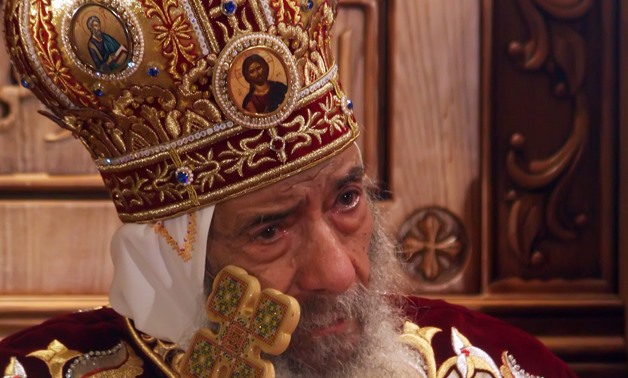
FILE- Pope Shenouda III during the Christmas Mass in Abbassyia Cathedral in Cairo- Egypt Today
CAIRO – 18 March 2018:“For many decades, we have narrated stories about the life of Pope Shenouda since he was born in Salam village,” said Muslim Sheikh Moustafa Qassim on the sixth anniversary of the death of Pope Shenouda III.
Late Pope Shenouda III, whose real name is Nazir Gaid Rufael, was chosen as Pope of Alexandria on November 14, 1971. His official title was Pope of Alexandria and Patriarch of All Africa on the Holy Apostolic of the Coptic Orthodox Church of Alexandria (he is commonly referred to as the Pope of the Coptic Christian Church); he was the117th Pope of the Coptic Christian Church.
He held the post until he died on March 17, 2012; his tomb is in the Monastery of Saint Pishoy in Wadi al-Natroun city of Beheira governorate (Delta).
“Muslims and Christians are living peacefully, and sharing celebrations of all their feasts. Salam Village has never seen a case of sectarian dispute,” said Sheikh Moustafa.

Late Pope Shenouda III's old house in Salam village- Egypt Today Mahmoud Agamy
Pope Shenouda III was born to a very humble family in Salam village, 11 kilometers away from Asyut governorate (Upper Egypt). His childhood house was located next to a mosque in a narrow alley, overlooking the Nile River. The abandoned house consists of two stories and is built of mud bricks.

Stairs leading to the second floor in late Pope Shenouda III's old house in Salam village- Egypt Today Mahmoud Agamy
Six years after his death, Egyptians in Pope Shenouda's hometown are still proudly talking about his childhood and the “peace and love” between Muslims and Christians in their village.
“We are so proud that Salam village is Pope Shenouda’s hometown […] We, here, are recalling Shenouda’s sermons,” Walid Wageih Naguib, one of Shenouda’s relatives, told Egypt Today.
“Pope Shenouda was always telling us that Muslims and Christians are relatives. And no one can divide them,” he added.
When he was a three-day-old infant, Shenouda’s mother passed away due to childbed fever. Three women, including a Muslim woman, breastfed him, said Raeda Naguib Morkos, one of Shenouda’s relatives.

Late Pope Shenouda III's old house in Salam village- Egypt Today Mahmoud Agamy
After the death of his mother, Shenouda’s elder brother took care of him. Many years later, he and his brother left the village, Morkos added, saying “my father has always talked to us about Pope Shenouda; he said that the Pope was fond of reading and writing and started writing poetry when he was 16 years old.”
“We call him the Pope of all Egyptians,” she said.
His successor Pope Tawadros II led the requiem mass for the sixth anniversary of Pope Shenouda III's death on Saturday at al-Surian Monastery in Wadi al-Naroun.
Political situations
As head of the Coptic Church, Pope Shenouda is a respected figure in the Coptic Christian community, which makes up to 10-15 percent of the Egyptian population.
During the 2011 protests, Pope Shenouda advised the public to remain at home to avoid instability and deteriorating security. Pope Shenouda also demanded that President Hosni Mubarak step down from his post if violence continues.

FILE- Pope Shenouda III during the Christmas Mass in Abbassyia Cathedral in Cairo- Egypt Today
On February 15, 2011, Pope Shenouda congratulated the youth of Egypt for a peaceful revolution and thanked the army for protecting Egypt from strife and instability. He continued by paying his condolences to the families who lost a relative or a friend during the protests.
Pope Shenouda’s influence goes beyond Egypt’s borders and into North America, Asia, Africa and Europe; he shed light on the Coptic Orthodox Church's beliefs, built new churches and appointed bishops.
Pope Shenouda banned Christians from traveling to Occupied Palestine “unless it is liberated” from Israeli occupation, so that both Christians and Muslims can travel together. The ban was issued after late President Anwar al-Sadat, who was at odds with Pope Shenouda, signed a peace treaty with Israel in 1979.
Additional reporting by Mahmoud Agamy




Comments
Leave a Comment